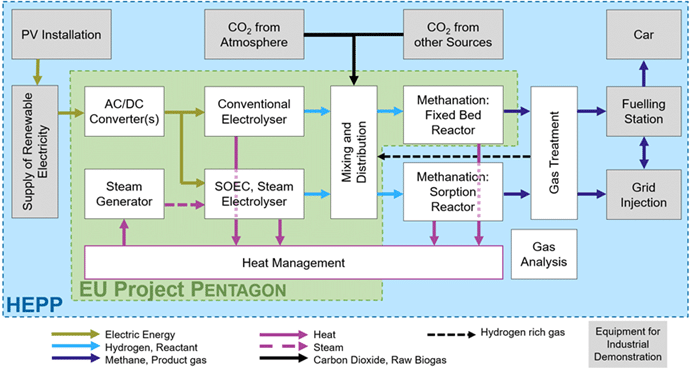The HEPP project (High Efficiency Power-to-Methane Pilot) lasts from 2017 to 2020 and is realized with research funding and funding from industrial partners. HEPP is implemented in the EU project Pentagon and thus into the framework programme Horizon 2020. In Pentagon there are ten institutions from academic research and industry from five European countries involved.

What ?
High efficiency due to technical innovations
The project HEPP was started to increase the efficiency of the Power-to-Methane technology and to demonstrate this technology in a near-industrial setting. The project team developed and build a 10kW demonstrator located in Rapperswil where a range of innovative technologies will be tested.
How ?
The concept of the plant combines a SOE (Solid Oxide Electrolyser) and a catalytic methanation reactor. The waste heat from the methanation process is collected by a thermal oil circuit and is used to raise the steam for the SOE. This leads to an efficiency increase of up to 10 percentage points to around 70% for industrial sized plants in the Megawatt (MW) scale. With this technological development the cost and the environmental impact of the SNG product is reduced. The concept development and the engineering have been concluded and the assembly work is in progress. It is expected to produce SNG in early 2019 and testing will be ongoing until the project end in 2020.

Who ?
The HEPP project (High Efficiency Power-to-Methane Pilot) lasts from 2017 to 2020 and is realized with research funding and funding from industrial partners.

Why ?
The aim of the HEPP project and the building of the new plant is to increase the efficiency of the Power-to-Methane technology in order to reduce production costs of synthetic natural gas (SNG) in the Megawatt (MW) scale. With this new development the costs for SNG should be reduced and the CO2 emissions worldwide should be decreased.
